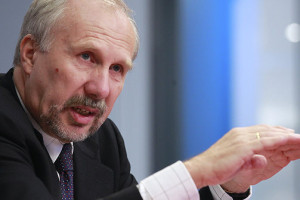
Posted on 23 October 2014.
 Besides boasting a superb fondue, beautiful scenery and first-class ski slopes, Switzerland is the best destination for immigrants. The survey of British bank HSBC Expat Explorer for 2014 took part 9 thousand immigrants worldwide, describing the quality of life, financial well-being and the ability to start a family in their new homeland.
Besides boasting a superb fondue, beautiful scenery and first-class ski slopes, Switzerland is the best destination for immigrants. The survey of British bank HSBC Expat Explorer for 2014 took part 9 thousand immigrants worldwide, describing the quality of life, financial well-being and the ability to start a family in their new homeland.
Second after Switzerland ranks Singapore, which is the richest financial center of Southeast Asia. The main advantages of the city-state as security, quality housing and diverse cuisine.
Despite the poor air quality, China ranks in the top three. The main reason is that the migrants in China receive more disposable income than most other places in the world. In the the country live the greatest number of high-immigrants. Almost 25% of immigrants there earning over 300 thousand USD annually against the world average of 5%. The dynamic economic environment is another factor for the happiness of Chinese immigrants. The economy in the country may be slowing, but its growth rate of over 7% it surpasses its competitors.
Germany, which has a reputation for safe and stable destination for foreigners in fourth place.
The modern and cosmopolitan archipelago in the Arabian Gulf - Bahrain, remains fifth. The country is an attractive destination for migrants in the Middle East mostly good balance between professional and personal life.
Sixth place in the ranking takes New Zealand, the country is defined as the best place to raise a family. The majority of immigrants there indicate good health, well-being and security of their children, noting that the country creates a more confident and better developed personalities.
Thailand occupying seventh position attracts immigrants affluent lifestyle at much lower prices than in their home countries, in their words.
Other countries completing the top 10 are also in Asia. These are Taiwan, India and Hong Kong, respectively, 8th, 9th and 10th place.
Posted in Comments

Posted on 22 October 2014.
 The European Central Bank (ECB) now should decide on purchases of corporate bonds, said the president of the Austrian Central Bank and a member of the ECB Governing Council Ewald Nowotny. The rumors for such purchases appeared in medias last week, but according to the central banker such discussion not yet started, but need to be analyzed.
The European Central Bank (ECB) now should decide on purchases of corporate bonds, said the president of the Austrian Central Bank and a member of the ECB Governing Council Ewald Nowotny. The rumors for such purchases appeared in medias last week, but according to the central banker such discussion not yet started, but need to be analyzed.
“There was no such discussion in the Governing Council and has taken no decision on the matter”, Novotny said, quoted by MarketWatch. “Buying corporate bonds would increase the balance sheet of the ECB, but first need to be addressed technical possibilities”,said the central banker.
The supporters of the possibility of purchases of corporate bonds indicate that this move will help the ECB to inject money into the economy of the euro area and to raise a record low inflation in the region. The central bank began its program of purchases of covered bonds on Monday, and will proceed to the purchase of asset-backed securities later this quarter. The central bankers, however, leave the door open for more action and Nowotny noted that the ECB would be reasonable to consider options to increase its balance sheet.
“Corporate bonds are one of the markets that are still open to that”, said Novotny. Before this, the Governing Council should consider a number of factors such as size of the market, its strength and regional distribution. “Personally, I support the smooth approach right now. Markets should not expect further action from each meeting of the Board”, said the banker.
Posted in Comments, Economy

Posted on 14 October 2014.
 The role of nuclear energy is the main topic of the political debate in different parts of European countries. This week in the two countries will have discussions about their dependence on nuclear energy. Today the Finnish Parliament will discuss the plan for a new nuclear facility, while the French Parliament will vote on the energy package, which provides for the reduction of dependence on nuclear energy. Last week, the European Commission (EC) has approved the plans of the UK to build a new nuclear power plant. The facility must provide 7% of the energy of the United Kingdom from 2023 Also last week, EU Competition Commissioner Joaquin Almunia said that British support for the project does not constitute illegal.
The role of nuclear energy is the main topic of the political debate in different parts of European countries. This week in the two countries will have discussions about their dependence on nuclear energy. Today the Finnish Parliament will discuss the plan for a new nuclear facility, while the French Parliament will vote on the energy package, which provides for the reduction of dependence on nuclear energy. Last week, the European Commission (EC) has approved the plans of the UK to build a new nuclear power plant. The facility must provide 7% of the energy of the United Kingdom from 2023 Also last week, EU Competition Commissioner Joaquin Almunia said that British support for the project does not constitute illegal.
The environmentalists fear that the approval of the British project will set a precedent and encourage other countries of the European Union (EU) to subsidize nuclear power plants. Regardless of government subsidies, nuclear power is likely to remain an important source of energy for a significant part of the EU. Half of the 28 member states of the European Union have nuclear power plants, which produce 14 percent of the energy consumed in the building. In France, for example, nuclear power plants produce three-quarters of the electricity consumed in the country.
After the Fukushima nuclear accident in March 2011, several European countries decided to reduce its dependence on nuclear energy or completely abandon the construction of new reactors. Germany, for example decides to stop working all nuclear power plants by 2022, but Switzerland is not an EU member, has decided to scrap plans for new reactors and gradually cease production of nuclear energy by 2034. The plan to revive nuclear energy in Italy failed miserably: 94% of voters opposed nuclear power in a referendum held three months after the Fukushima accident. In Italy, nuclear power plants operating in the period from 1960 to 1990 because of the strong public reaction to the accident at the Chernobyl plant were closed.
Meanwhile, in 2012 the Belgian government led by Prime Minister Elio Di Rupo, has decided that the country should be free of nuclear projects by 2025 The first step is the closure of two units next year. Closure, however, will be delayed. Belgium is facing a possible energy shortages this winter, ironically, because three other nuclear reactors had to suspend work. Since the Fukushima accident have passed more than three and a half years and it seems public opposition to nuclear energy began to die out. A similar phenomenon was seen in the Chernobyl accident - strong opposition immediately after the incident. A year later, the number of opponents of nuclear energy decreases.
It’s hard to talk about “European attitude” towards nuclear energy. The results of the latest poll by the European Commission show large differences between countries in the community. Public opinion on the issue varies across the continent and has cultural and historical roots. In Britain, however, attitudes have remained relatively stable despite the Fukushima accident. However, nuclear energy can help some countries to meet their emission reduction emitted due to fossil fuel power plants. The European leaders to set goals for change in 2030.
Posted in Comments, Economy

Posted on 12 October 2014.
 More Italians pay their taxes with paintings and sculptures. This occurs after the moves by the government aimed at reviving the system of transfer of cultural property to the state instead of paying taxes. The Ministry of Culture and Tourism announced that the competent minister Dario Franceschini has chosen a group of experts to calculate the value of the works offered to cover the taxes on inheritance and income. Besides historical artwork government accepts donations of properties that have archaeological value, contemporary works of art, antique books and villas. The creation of this team is a “necessary step” to restart the system, which was established in 1982, but almost not used, said in a statement from the ministry.
More Italians pay their taxes with paintings and sculptures. This occurs after the moves by the government aimed at reviving the system of transfer of cultural property to the state instead of paying taxes. The Ministry of Culture and Tourism announced that the competent minister Dario Franceschini has chosen a group of experts to calculate the value of the works offered to cover the taxes on inheritance and income. Besides historical artwork government accepts donations of properties that have archaeological value, contemporary works of art, antique books and villas. The creation of this team is a “necessary step” to restart the system, which was established in 1982, but almost not used, said in a statement from the ministry.
Donation of art instead of paying inheritance tax is a widely used practice in other European countries. In Britain, a similar scheme garnered 50 million GBP (80.4 million ISD) 2012-2013 by Arts Council England. Franceschini who insists on collecting more public and private funding for the maintenance of Venice and the Uffizi Gallery in Florence, argues that the adoption of art instead of taxes will help the country to achieve its “dual purpose”. “On the one hand, in times of crisis, it allows people to fulfill their tax obligations through the sale of works of art, on the other - Italy regained its historical and artistic assets”, he said.
The payment of taxes and protecting works of art and architecture are topics that have long commented in Italy. The country entered a recession for the third time in six years and trying to make budget savings. According to the Ministry of Economy tax expenditures cost the country about 91 billion EUR per year.
Posted in Comments

Posted on 08 October 2014.
 ECB may purchase ABS and bonds for 1 trillion EUR, revealed the Vice President of the financial institution Vitor Constancio. ECB launched a program for targeted long-term lending, alongside such an asset purchase, the details of which President Mario Draghi unveiled last week. He did not comment on the size of the program. The incentives are part of the successive attempts of central bankers to fight deflation and stimulate growth in the Eurozone, whose economy stagnated in the second quarter.
ECB may purchase ABS and bonds for 1 trillion EUR, revealed the Vice President of the financial institution Vitor Constancio. ECB launched a program for targeted long-term lending, alongside such an asset purchase, the details of which President Mario Draghi unveiled last week. He did not comment on the size of the program. The incentives are part of the successive attempts of central bankers to fight deflation and stimulate growth in the Eurozone, whose economy stagnated in the second quarter.
“The total amount of purchased ABS and covered bonds is sufficient to ensure that asset purchases can be made on a large scale”, said Constancio. “Of course, we are aware that the quantities that we can redeem will be small compared to the quantities of the theory”, he added.
Constancio said that the total amount of covered bonds in the Eurozone amounts to 1.2 trillion EUR, the ECB may buy 600 billion EUR from them. Meanwhile the purchases of securities backed by assets may be up to 400 billion EUR of the total amount of 690 billion EUR.
Although the Greek and Cypriot securities will be excluded from the scope of the program, although not own investment evaluation “will be introduced to reduce the risks”, says vice president of the ECB. “They do not have the intention to purchase securities without investment grade - those who carry a high risk of default on them”, he added.
Posted in Comments, Finance

Posted on 31 August 2014.
 How many times have you received a payday loan? Do you know of anybody that has used a payday advance service before? I ask this because most people have or know somebody that has used a payday advance service in the past and they would be a good person to talk to about the benefit of getting one.
How many times have you received a payday loan? Do you know of anybody that has used a payday advance service before? I ask this because most people have or know somebody that has used a payday advance service in the past and they would be a good person to talk to about the benefit of getting one.
What most people hear is that payday advance loans charge a high fee. This is not always the case but the reason some companies do this is because the people they are lending money to are not that good with paying money back. Some payday advance companies will run a quick credit check just so they can get an idea of how trustworthy you are but not all will put you through this. The benefit of getting a credit report is that you might look better in the eyes of the payday advance company and therefore, they might give you a better rate on your loan. Just know that your payday advance loans are short and it might only stay open for a week or two.
One of the main benefits of a payday advance loan is that you don’t have to get pre-approved for them. A lot of people can’t get regular bank loans because of all the paperwork involved with them and that is why they turn to payday advance loans instead. The nice thing about them is that you can go in one day and come up an hour later with the money that you need. Although, these work for some people they are not as good for others with great credit and the ability to get cash from an actual bank. Payday advance loans are great but I would still recommend that you work on increasing your credit rating so that you can get regular loans from now on.
Posted in Comments

Posted on 20 August 2014.
 The wages and bonuses for employees of hedge funds in London fell by over 50% until 2012 and after the profit in the sector started to shrink. For the last two years, the average amount of hedge funds bonuses decreased by 94% to 8000 GBP from 135,000 GBP 2 years ago. The wages also fell to 90,000 GBP from a value of 120 000 GBP in 2012.
The wages and bonuses for employees of hedge funds in London fell by over 50% until 2012 and after the profit in the sector started to shrink. For the last two years, the average amount of hedge funds bonuses decreased by 94% to 8000 GBP from 135,000 GBP 2 years ago. The wages also fell to 90,000 GBP from a value of 120 000 GBP in 2012.
The hedge funds profit decreased, as net flows slow. This reflected to the managers wages and bonuses, which signed shapr drop in the last years. In addition, the harsh regulations increase costs. The return also lags behind the growth rates of the leading indices. The Hedge Funds Aggregate Index, which tracks the performance of more than 2400 hedge funds managing assets of over 470 billion USD rose only 2.5% this year. In 2013 its progress was 7.4%. For comparison the broad MSCI World Index grew with 4.3% since the beginning of 2014, after last year added 24% to its value.
This year, the managers of hedge funds may not reach even half of the profits made in 2013, as according to analysts research they expect to achieve a return of 5% or less in 2014.
Posted in Comments

Posted on 19 August 2014.
 The US companies lose interest of acquisitions in China, despite the 47% expansion of the American mergers and acquisitions abroad. In the first seven months of 2013 companies from the United States spent 2.3 billion USD for acquisitions in China, while this year the amount is a 611 million USD, or nearly four times less. In this way the volume of acquisitions by American companies in China marked its lowest level in 12 years.
The US companies lose interest of acquisitions in China, despite the 47% expansion of the American mergers and acquisitions abroad. In the first seven months of 2013 companies from the United States spent 2.3 billion USD for acquisitions in China, while this year the amount is a 611 million USD, or nearly four times less. In this way the volume of acquisitions by American companies in China marked its lowest level in 12 years.
Part of the problem is related to the absence of big deals this year. In the same period of 2013 were signed two major agreements totaling at 1.3 billion USD.
The negative trend of China, however, comes not only from USA. The volume of all mergers and acquisitions in the country during the first seven months of 2014 was 10% lower yoy. Lower is also the sheer number of agreements that reached 271, which is the worst result for the period from 2003. The reduced interest of business of USA in the private sector the second largest economy in the world may end a decade of starvation for Chinese companies. The volume of the agreements so far this year remained below 2 billion USD only in severe crisis in 2012 in the last 10 years.
Posted in Business, Comments

Posted on 18 August 2014.
 The US banks are preparing for relocation from UK to Ireland in relation to fears that the country is moving away from the European Union. Bank of America (BofA), Citigroup and Morgan Stanley see Ireland as a good place for a part of their European business, if they have to move from the UK. Largely their plans are in the very beginning, but sources say they started to prepare for the introduction of the European banking union that threatens to isolate Great Britain, which ultimately can lead to the release of the kingdom by the EU.
The US banks are preparing for relocation from UK to Ireland in relation to fears that the country is moving away from the European Union. Bank of America (BofA), Citigroup and Morgan Stanley see Ireland as a good place for a part of their European business, if they have to move from the UK. Largely their plans are in the very beginning, but sources say they started to prepare for the introduction of the European banking union that threatens to isolate Great Britain, which ultimately can lead to the release of the kingdom by the EU.
The main part of the activities of the most American and Asian banks in Europe is located in Britain. The relocation automatically opens the door for their services to all 28 EU member states. The heads of the American banks in Europe are reluctant to issue a public concern, fearing not to get in conflict with the British regulators. The senior leaders of American banks were of the opinion that it would hardly be possible if Britain leaves the community, the so-called option Brexit. The possibility of this option is real, after the British Prime Minister David Cameron has promised a referendum if Britain should stay in the EU.
Meanwhile, the European Central Bank (ECB) prepares to take over the management of the largest banks in the Eurozone later this year, rising concerns among bankers in USA that it would push the UK from the rest of the European banking system. Britain has challenged one of the decisions of the ECB, which will force clearing houses in London performing EUR-denominated transactions to move in the Eurozone.
In UK are working over 250 foreign banks, which are generating profit from financial services worth at 71 billion USD last year, one third of them from trade with the EU.
According to most observers, if Britain leaves the EU, Frankfurt or Paris will be the most likely alternatives for the American banks to transfer part of their European business. However, Ireland has attracted banks with its low corporate tax, English speaking population, laws close to the Anglo-Saxon legal system and membership in the Eurozone. Moreover, Citigroup, BofA and JP Morgan already have banking licenses in Ireland, allowing them to extend their activities in other EU countries.
Posted in Business, Comments, Finance

Posted on 24 July 2014. Tags: European Union
 The president of the German central bank Jens Weidmann urged UK to stay in EU and to follow the legacy of Winston Churchill to “restore the European family”. That was announced against the possibility of holding a referendum leaving the economic bloc in 2017. The referendum will be held, provided that the main force in the current coalition government - the Conservative Party won an absolute majority in parliament elections next year. The fear of UK separation from EU grew even more after the Eurosceptic Independence Party (Ukip) in United Kingdom won higher percentage on the European elections.
The president of the German central bank Jens Weidmann urged UK to stay in EU and to follow the legacy of Winston Churchill to “restore the European family”. That was announced against the possibility of holding a referendum leaving the economic bloc in 2017. The referendum will be held, provided that the main force in the current coalition government - the Conservative Party won an absolute majority in parliament elections next year. The fear of UK separation from EU grew even more after the Eurosceptic Independence Party (Ukip) in United Kingdom won higher percentage on the European elections.
A lot of links connect UK with the rest of Europe and this integration brings benefits to both parties, said Weidmann on a meeting of the Chambers of Commerce in the UK and Germany. He was an outspoken supporter of Britain’s membership of the European single market, but for the first time addressed a similar impassioned appeal to their British counterparts.
Amid the growing public support to Ukip, the position of the business to the membership of the crown in the EU is more heterogeneous. Fears of a referendum on Britain staying in the Union have become one of the main problems facing British business. While much of it supported the ideas for reform in the economic bloc, many fear that uncertainty could hurt investor confidence. Half of British trade is with the rest of EU, its membership in the EU has increased its exports outside the single European market by about 50%, according to studies cited by Weidmann. He cites a survey of London School of Economics, under which EU membership has brought the British GDP growth of over 10%.
Even better results would have been possible if Britain and Germany join efforts in reforming the Single Market for services. While the EU has managed to make the market more competitive goods, this service remains fragmented, said Weidmann. The president of the German central bank urged the UK to support changes to the rules relating to the digital economy, arguing that they will improve competitiveness.
“The European Union is still divided into 28 separate digital markets, which slows down innovation, growth and employment” he finished.
Posted in Comments, Finance
 Besides boasting a superb fondue, beautiful scenery and first-class ski slopes, Switzerland is the best destination for immigrants. The survey of British bank HSBC Expat Explorer for 2014 took part 9 thousand immigrants worldwide, describing the quality of life, financial well-being and the ability to start a family in their new homeland.
Besides boasting a superb fondue, beautiful scenery and first-class ski slopes, Switzerland is the best destination for immigrants. The survey of British bank HSBC Expat Explorer for 2014 took part 9 thousand immigrants worldwide, describing the quality of life, financial well-being and the ability to start a family in their new homeland.























